语法-一般过去时与过去进行时
过去进行时和一般过去时的区别
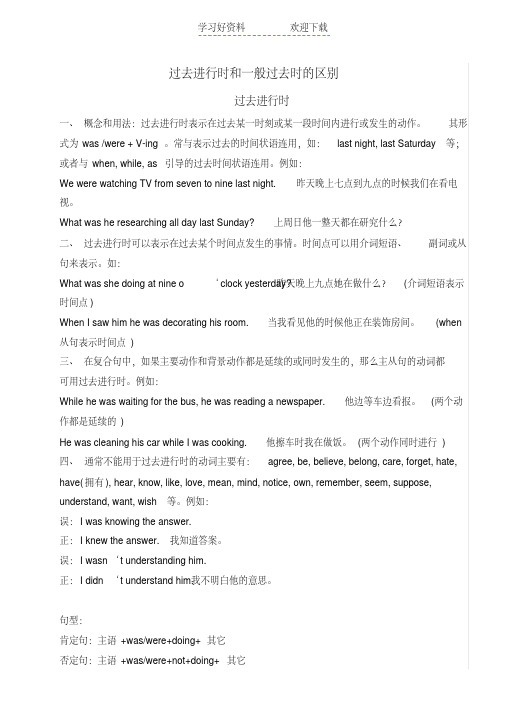
过去进行时和一般过去时的区别过去进行时一、概念和用法:过去进行时表示在过去某一时刻或某一段时间内进行或发生的动作。
其形式为was /were + V-ing。
常与表示过去的时间状语连用,如:last night, last Saturday等;或者与when, while, as引导的过去时间状语连用。
例如:We were watching TV from seven to nine last night. 昨天晚上七点到九点的时候我们在看电视。
What was he researching all day last Sunday? 上周日他一整天都在研究什么?二、过去进行时可以表示在过去某个时间点发生的事情。
时间点可以用介词短语、副词或从句来表示。
如:昨天晚上九点她在做什么?(介词短语表示What was she doing at nine o‘clock yesterday?时间点)When I saw him he was decorating his room. 当我看见他的时候他正在装饰房间。
(when 从句表示时间点)三、在复合句中,如果主要动作和背景动作都是延续的或同时发生的,那么主从句的动词都可用过去进行时。
例如:While he was waiting for the bus, he was reading a newspaper.他边等车边看报。
(两个动作都是延续的)He was cleaning his car while I was cooking. 他擦车时我在做饭。
(两个动作同时进行) 四、通常不能用于过去进行时的动词主要有:agree, be, believe, belong, care, forget, hate, have(拥有), hear, know, like, love, mean, mind, notice, own, remember, seem, suppose, understand, want, wish等。
一般过去时和过去进行时的用法、区别与联系
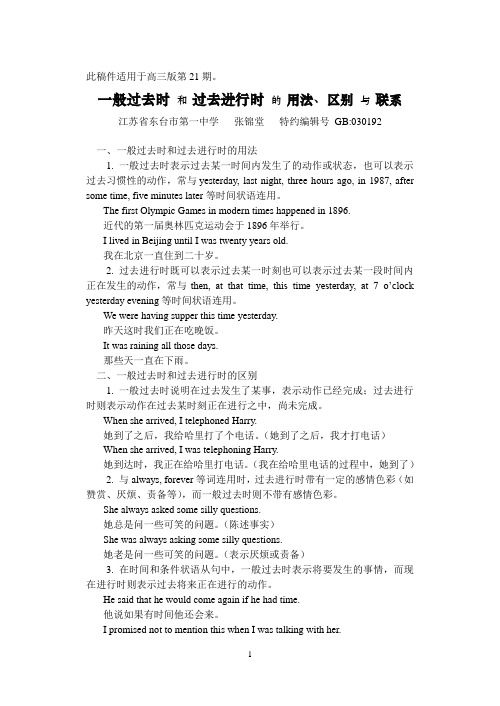
此稿件适用于高三版第21期。
一般过去时和过去进行时的用法、区别与联系江苏省东台市第一中学张锦堂特约编辑号GB:030192一、一般过去时和过去进行时的用法1. 一般过去时表示过去某一时间内发生了的动作或状态,也可以表示过去习惯性的动作,常与yesterday, last night, three hours ago, in 1987, after some time, five minutes later等时间状语连用。
The first Olympic Games in modern times happened in 1896.近代的第一届奥林匹克运动会于1896年举行。
I lived in Beijing until I was twenty years old.我在北京一直住到二十岁。
2. 过去进行时既可以表示过去某一时刻也可以表示过去某一段时间内正在发生的动作,常与then, at that time, this time yesterday, at 7 o’clock yesterday evening等时间状语连用。
We were having supper this time yesterday.昨天这时我们正在吃晚饭。
It was raining all those days.那些天一直在下雨。
二、一般过去时和过去进行时的区别1. 一般过去时说明在过去发生了某事,表示动作已经完成;过去进行时则表示动作在过去某时刻正在进行之中,尚未完成。
When she arrived, I telephoned Harry.她到了之后,我给哈里打了个电话。
(她到了之后,我才打电话)When she arrived, I was telephoning Harry.她到达时,我正在给哈里打电话。
(我在给哈里电话的过程中,她到了)2. 与always, forever等词连用时,过去进行时带有一定的感情色彩(如赞赏、厌烦、责备等),而一般过去时则不带有感情色彩。
英语一般过去时和过去进行时
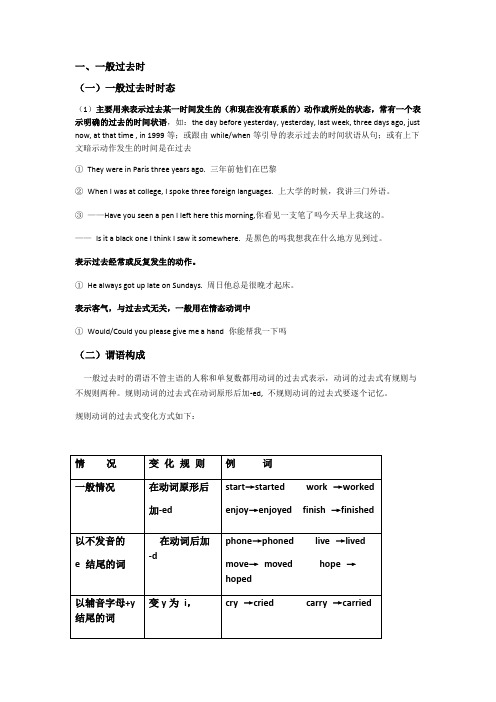
一、一般过去时(一)一般过去时时态(1)主要用来表示过去某一时间发生的(和现在没有联系的)动作或所处的状态,常有一个表示明确的过去的时间状语,如:the day before yesterday, yesterday, last week, three days ago, just now, at that time , in 1999等;或跟由while/when等引导的表示过去的时间状语从句;或有上下文暗示动作发生的时间是在过去①They were in Paris three years ago. 三年前他们在巴黎②When I was at college, I spoke three foreign languages. 上大学的时候,我讲三门外语。
③——Have you seen a pen I left here this morning,你看见一支笔了吗今天早上我这的。
——Is it a black one I think I saw it somewhere. 是黑色的吗我想我在什么地方见到过。
表示过去经常或反复发生的动作。
①He always got up late on Sundays. 周日他总是很晚才起床。
表示客气,与过去式无关,一般用在情态动词中①Would/Could you please give me a hand 你能帮我一下吗(二)谓语构成一般过去时的谓语不管主语的人称和单复数都用动词的过去式表示,动词的过去式有规则与不规则两种。
规则动词的过去式在动词原形后加-ed, 不规则动词的过去式要逐个记忆。
规则动词的过去式变化方式如下:不规则动词的过去式(举例)begin →began go →went see →saw do →did get →got come →came leave →left am →was are →were give →gave have →had think →thought一般过去时的否定式和疑问式(1)实义动词的一般过去时的否定式和疑问式要用助动词did帮助构成。
一般过去时和过去进行时的区别

目录
• 定义与概念 • 用法与语境 • 结构与形式 • 时间表达与时间点 • 常见错误与注意事项
01
定义与概念
一般过去时的定义
描述过去发生的动作 或状态,强调动作已 经完成。
句子结构通常包括助 动词did + 动词原形。
用于表达过去的经验、 事实或回忆。
过去进行时的定义
一般过去时更为常见。
时则更适用于描述过去的某个时间段内
正在发生的动作或状态。
05
常见错误与注意事项
一般过去时的常见错误
混淆时态
一般过去时和过去进行时在某些情况下可能相似,但含义不同。 常见错误是混淆两者,导致时态使用不当。
遗漏助动词
在一般过去时的句子中,有时会遗漏助动词did,导致句子结构不 完整或语法错误。
生的动作。
用于表达对过去某个动作的计划 或意图,但该动作最终可能并未
实际发生。
两者时间表达与时间点的比较
一般过去时强调动作的结果或状态在过 去的某个时间点已经完成,而过去进行 时强调动作在过去的某个时间段内正在
持续进行。
一般过去时适用于描述过去的某个具体 在表达过去的习惯或经常发生的动作时,
时间点发生的动作或状态,而过去进行
动词形式
两种时态的动词形式不同,需要注意正确使用。一般过去时的动词用过 去式,而过去进行时的动词用was/were + -ing形式。
03
从句时态
在复合句中,从句的时态应与主句保持一致。如果主句是一般过去时,
从句也应使用相应的过去时态,避免出现逻辑上的混乱。
感谢您的观看
THANKS
表达过去某个时间段内持续进行的动作或状态,例如
一般过去时与过去进行时的区别
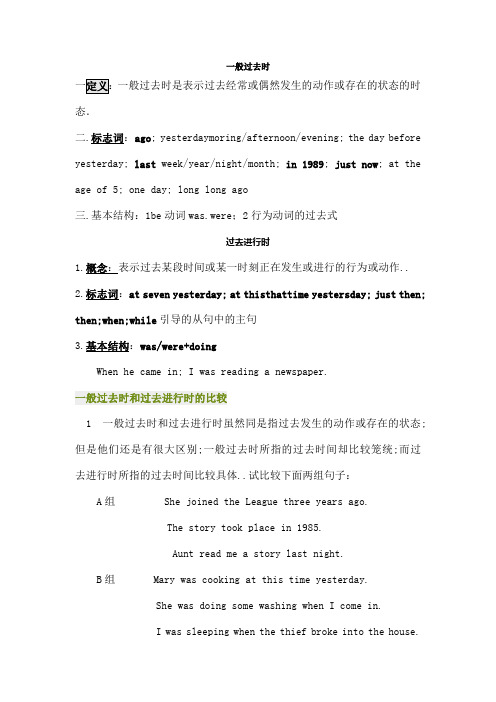
一般过去时一般过去时是表示过去经常或偶然发生的动作或存在的状态的时态.二.标志词:ago; yesterdaymoring/afternoon/evening; the day before yesterday; last week/year/night/month; in 1989; just now; at the age of 5; one day; long long ago三.基本结构:1be动词was.were;2行为动词的过去式过去进行时1.概念:表示过去某段时间或某一时刻正在发生或进行的行为或动作..2.标志词:at seven yesterday; at thisthattime yestersday; just then; then;when;while引导的从句中的主句3.基本结构:was/were+doingWhen he came in; I was reading a newspaper.一般过去时和过去进行时的比较1 一般过去时和过去进行时虽然同是指过去发生的动作或存在的状态;但是他们还是有很大区别;一般过去时所指的过去时间却比较笼统;而过去进行时所指的过去时间比较具体..试比较下面两组句子:A组 She joined the League three years ago.The story took place in 1985.Aunt read me a story last night.B组 Mary was cooking at this time yesterday.She was doing some washing when I come in.I was sleeping when the thief broke into the house.A组中的three years ago、in 1985、last night 所指的过去时间均较为笼统;因此必须采用一般过去时..而B组中的at this time yesterday、 when I came in、 when the thief broke into the house 所指的过去时间均较为具体;因此必须采用过去进行时..2 一般过去时和过去进行时;除了他们所指的时间有差别之外;还可以通过他们动作的性质来加以区别..一般过去时表示在过去某个时间发生的动作或存在的状态;也表示过去经常或反复发生的动作..它强调的是动作的“发生”或状态的“存在”..过去进行时表示在过去某一时刻或在过去某一段时间内正在进行的动作..它强调的是动作的“正在进行”..试比较下面两组句子:C组Did he watch TV last nightI got up at five yesterday.I studied in that class last year.D组 Mum was doing some washing yesterday evening.We were cleaning the classroom this time yesterday.The teacher was talking to some parents when I saw her.C组中的“看电视”、“起床”、“学习”都是属于过去某一时候动作的“发生”或状态的“存在”;所以必须采用一般过去时..而D组中的“在洗衣服”、“在打扫教室”、“正在谈话”都是指过去某一时刻动作“正在进行”;所以必须采用过去进行时..3 有时;同是发生于过去某一个时候的某一个动作;既可采用一般过去时;也可采用过去进行时;但其语意却不尽相同;而且还有着很大的区别..试比较下列几对句子:Jack wrote a letter to his parents last night.杰克昨晚给他的父母写了封信..信写完了Jack was writing a letter to his parents last night.杰克昨晚一直在给他的父母写信..信不一定写完They planted trees last Sunday. 他们上星期天植树..树植完They were planting trees last Sunday. 他们上星期天一直在植树..树不一植完注意:一般过去时的谓语动词;即可用延续性动词;也可用非延续性动词;而过去进行时的谓语动词只能用延续性动词..如A组句型中的;“join”、“take place”为非延续性动词;“read”为延续性动词;B组句型中的“cook”、“do”与“sleep”均为延续性动词..练习题1. I ___________ have an exciting party last weekend.2. --_____________she _____________play her guitar吉他 yesterday --No; she _____________.3.—What ___________Tom __________ do on Saturday evening--He _________watch TV and __________read an interesting book.4. They all ____________go to the mountains yesterday morning.5. She _____________not visit her aunt last weekend. She ____________stay at home and ___________do some cleaning.6. I cleaned my classroom ___________.A with three hoursB three hours agoC inthree hours7. The reporter said that the UFO ___ east to west when he sawit.A. was travelingB. traveledC. had been travelingD. was totravel8 . ___________ He did some reading at home.A What does your father do yesterday eveningB What does yourbrother do in the schoolC What did your brother do over the weekend9. What did you do ________ I went to the movies.A next morning Blast weekend C in the weekend10.. “What’s the matter; Ali You look sad.”“Oh; nothing much. As a matter of fact; I ___ of my friendsA. just thoughtB. have just been thinkingC. was just thinking11.My brother ___ while he ___ his bicycle and hurt himself.A. fell; was ridingB. fell; were ridingC. had fallen; rode12. Tom ___ into the house when no one ___.A. slipped was looking B was slipping; looked C slipped; hadlooked13.The last time I __ Jane she ___ cotton in the fields.A. saw; was pickingB. saw; pickedC. had seen; picked14.I don 't think Jim saw me; he ___ into space.A. just staredB. was just staringC. has just stared15.I first met Lisa three years ago. She ___ at a radio shop at the time.A. has workedB. was workingC. had been workingD. had worked16;John_______work all day yesterday.17;He _______walk home when the rian_______begin.18—What______you _______do at ten o'clock yesterday﹖—I_______studay in class.19.When Harry _______have breakfast Lily _______telephone him.20.When I ________ go to school this morning I ______ see a car running into a bus.。
一般过去式和过去进行时-有答案解析
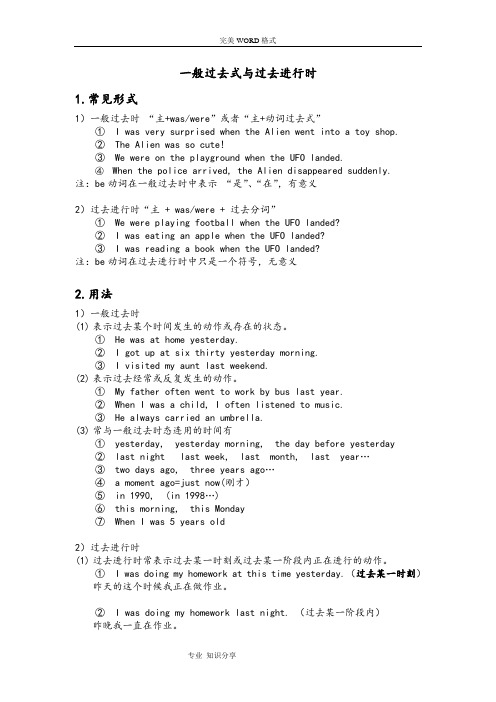
一般过去式与过去进行时1.常见形式1)一般过去时“主+was/were”或者“主+动词过去式”①I was very surprised when the Alien went into a toy shop.②The Alien was so cute!③We were on the playground when the UFO landed.④When the police arrived, the Alien disappeared suddenly.注:be动词在一般过去时中表示“是”、“在”,有意义2)过去进行时“主 + was/were + 过去分词”①We were playing football when the UFO landed?②I was eating an apple when the UFO landed?③I was reading a book when the UFO landed?注:be动词在过去进行时中只是一个符号,无意义2.用法1)一般过去时(1)表示过去某个时间发生的动作或存在的状态。
①He was at home yesterday.②I got up at six thirty yesterday morning.③I visited my aunt last weekend.(2)表示过去经常或反复发生的动作。
①My father often went to work by bus last year.②When I was a child, I often listened to music.③He always carried an umbrella.(3)常与一般过去时态连用的时间有①yesterday, yesterday morning, the day before yesterday②last night last week, last month, last year…③two days ago, three years ago…④ a moment ago=just now(刚才)⑤in 1990, (in 1998…)⑥this morning, this Monday⑦When I was 5 years old2)过去进行时(1)过去进行时常表示过去某一时刻或过去某一阶段内正在进行的动作。
(完整版)英语一般过去时和过去进行时
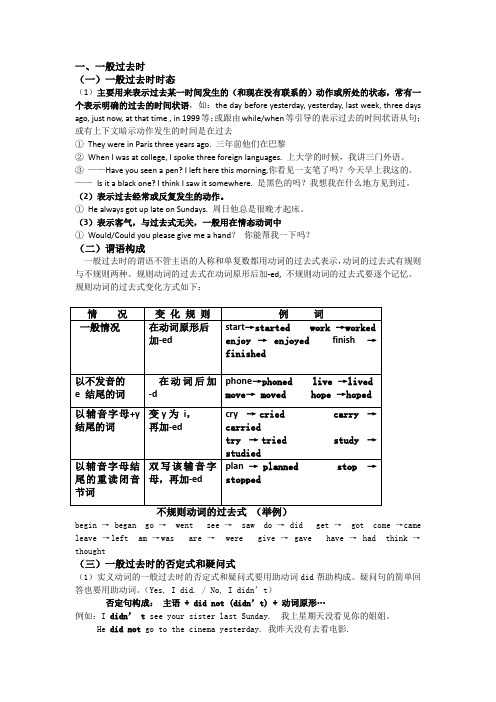
一、一般过去时(一)一般过去时时态(1)主要用来表示过去某一时间发生的(和现在没有联系的)动作或所处的状态,常有一个表示明确的过去的时间状语,如:the day before yesterday, yesterday, last week, three days ago, just now, at that time , in 1999等;或跟由while/when等引导的表示过去的时间状语从句;或有上下文暗示动作发生的时间是在过去①They were in Paris three years ago. 三年前他们在巴黎②When I was at college, I spoke three foreign languages. 上大学的时候,我讲三门外语。
③——Have you seen a pen? I left here this morning,你看见一支笔了吗?今天早上我这的。
——Is it a black one? I think I saw it somewhere. 是黑色的吗?我想我在什么地方见到过。
(2)表示过去经常或反复发生的动作。
①He always got up late on Sundays. 周日他总是很晚才起床。
(3)表示客气,与过去式无关,一般用在情态动词中①Would/Could you please give me a hand?你能帮我一下吗?(二)谓语构成一般过去时的谓语不管主语的人称和单复数都用动词的过去式表示,动词的过去式有规则与不规则两种。
规则动词的过去式在动词原形后加-ed, 不规则动词的过去式要逐个记忆。
规则动词的过去式变化方式如下:begin → began go → went see → saw do → did get → got come →came leave →left am →was are → were give → gave have → had think →thought(三)一般过去时的否定式和疑问式(1)实义动词的一般过去时的否定式和疑问式要用助动词did帮助构成。
一般过去时过去完成时和过去进行时的区别
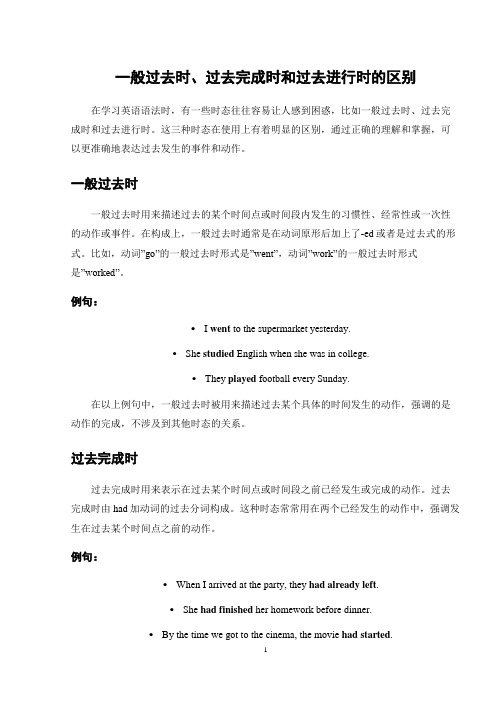
一般过去时、过去完成时和过去进行时的区别在学习英语语法时,有一些时态往往容易让人感到困惑,比如一般过去时、过去完成时和过去进行时。
这三种时态在使用上有着明显的区别,通过正确的理解和掌握,可以更准确地表达过去发生的事件和动作。
一般过去时一般过去时用来描述过去的某个时间点或时间段内发生的习惯性、经常性或一次性的动作或事件。
在构成上,一般过去时通常是在动词原形后加上了-ed或者是过去式的形式。
比如,动词”go”的一般过去时形式是”went”,动词”work”的一般过去时形式是”worked”。
例句:•I went to the supermarket yesterday.•She studied English when she was in college.•They played football every Sunday.在以上例句中,一般过去时被用来描述过去某个具体的时间发生的动作,强调的是动作的完成,不涉及到其他时态的关系。
过去完成时过去完成时用来表示在过去某个时间点或时间段之前已经发生或完成的动作。
过去完成时由had加动词的过去分词构成。
这种时态常常用在两个已经发生的动作中,强调发生在过去某个时间点之前的动作。
例句:•When I arrived at the party, they had already left.•She had finished her homework before dinner.•By the time we got to the cinema, the movie had started.在以上例句中,过去完成时指明了在过去某个时间点之前已经完成的动作,通过这种时态可以清晰地表达出事件之间的先后顺序。
过去进行时过去进行时用来描述在过去某个具体时间或时间段内正在进行的动作。
过去进行时由was/were加动词的ing形式构成。
这种时态强调了动作或事件发生时正在进行的状态。
- 1、下载文档前请自行甄别文档内容的完整性,平台不提供额外的编辑、内容补充、找答案等附加服务。
- 2、"仅部分预览"的文档,不可在线预览部分如存在完整性等问题,可反馈申请退款(可完整预览的文档不适用该条件!)。
- 3、如文档侵犯您的权益,请联系客服反馈,我们会尽快为您处理(人工客服工作时间:9:00-18:30)。
Grammar:Tenses 一般过去时与过去进行时一般过去时Past Simple构成:was, were (be动词);did时间状语:yesterday; last week; in 1945, at that time; just now; during the war; before; a few days ago; when…等基本用法:1)表示过去某个时间发生的动作或情况,或过去习惯性动作,不强调...对现在的影响。
通常与表示具体的过去时间的状语连用,或有上下文语境暗示。
He often came to see me while I was in Shanghai.The window was broken by the naughty boy last week.Sales of CDS have greatly increased since the early 1990s, when people ______ to enjoy the advantages of this new technology.A. beginB. beganC. have begunD. had begun我十年前开始学英语,但现在还是说得不够好。
I __________ to learn English ___________________, but I still _______ speak it wellenough now.2)在时间、条件、方式或让步状语从句中,用一般过去时代替过去将来时。
He promised to buy me a computer if he got a raise.Ex. She told me that she ________ leave until I _____ back.A. will not; cameB. will not; comeC. would not; cameD. would not; come3) 两个或两个以上在过去接连发生的一串动作用and或but 连接时,用一般过去He bought a watch but lost it.Suddenly, a tall man driving a golden carriage _______ the girl and took her away, ____ in the woods.A. seizing, disappearedB. seized, disappearedC. seizing, disappearingD. seized, disappearing4)有时可以代替一般现在时,表达一种婉转、客气、礼貌、商量的语气。
I wanted to ask you if I could borrow your bike?Would you mind my sitting here?注意:一般过去时中动词过去时的形式。
begin forget reply hear buildcost choose read destroy feelteach break develop leave speakspend write teach stop lead过去进行时Past Continuous构成:was/were doing时间状语:at that time, at nine yesterday, when I arrived,或表示一段时间的this morning, yesterday等。
基本用法:1)表示在过去某一时刻正在发生的动作。
有时没有出现时间状语,要注意上下文的暗示。
What were you doing at nine last night?I don’t think Jim saw me; he was staring into space.How fast _____ he ______ when the accident _______? (drive, happen)2)表示某一时段持续的动作I was painting a picture yesterday evening.上周整整一周我都在家呆着。
_________________________________________________________________The reporter said that the UFO was traveling east to west when he saw it.3)与always, constantly等频度副词连用时具有一定的感情色彩。
My grandfather was always forgetting things.那时他从来不满足,总是在抱怨。
_______________________________________________________________4)与when 引导的时间状语从句连用,表示“某人正在/正要做…这时突然...”相当于and at that timeLily was having a holiday with her family in a wildlife park when she was bitten on the leg by a lion.The students _______busily when Miss Brown went to get a book she _____in the office.A. had written, leftB. were writing, has leftC. had written, had leftD. were writing, had left时态区分:一般过去时与过去进行时相同点:动作都发生在过去不同点:一般过去时表示在过去某个具体时间内发生了某一动作,而且动作已经完成,和现在没有关系。
过去进行时表示某一点或某一段时间内正在进行的动作,动作是否结束或完成不清楚。
He wrote a book last year. ( ) He was writing a book last year. ( )Ex: Finish the sentences with proper tenses.(一般现在时、一般过去时、现在进行时、过去进行时)1. We _______________________ (not see) the beginning because we ________ (be) late.2. We __________________ (talk ) quietly at the bar when a fight broke out.3. He ________________( have ) breakfast when the crash _____________ ( report) on TV.4. Two days ago I ________________ (fall off) my bike and ___________ (break) my arm.5. They ___________ (stand) there for an hour watching the game.6. We _____________ (see) him when he ___________ (come) to town, but that isn’t often.7. A few years later I ___________ (drop) medicine and ______________ (take up) physics.8. What _________ you _____________ (do) when I ____________ (call) you last night?9. I ___________ (see) you in the park yesterday. You ________________ (sit) on the grass and ______________ (read) a book.10. John _____________ (take) a photograph of me while I _________________ (not look).11. I ___________________ (walk) along the street when suddenly I ____________ (hear) footsteps behind me. Somebody _____________ (follow) me. I was frightened and I _______________ (start) to run.12. Tom ______________ (burn) his hand while he _________________ (cook) the dinner.13. I _____________ (cycle) home yesterday when suddenly a man _______________ (step) out in front of me. I ______________ (go) quite fast but luckily I ______________ (manage) to stop in time and ___________________ (not hit) him.14. Most people ______________ (learn) to swim when they _________ (be) young.15. Sonia _______________________ (look) for a place to live. She ___________________ (stay) with her sister until she finds somewhere.Grammar:一般过去时与过去进行时Keys:Bbegan, ten years ago, can’tCDwas, driving, happenedI was staying at home all last week.He was never satisfied at that time. He was always complaining.D书是去年写的,而且已经写完了。
